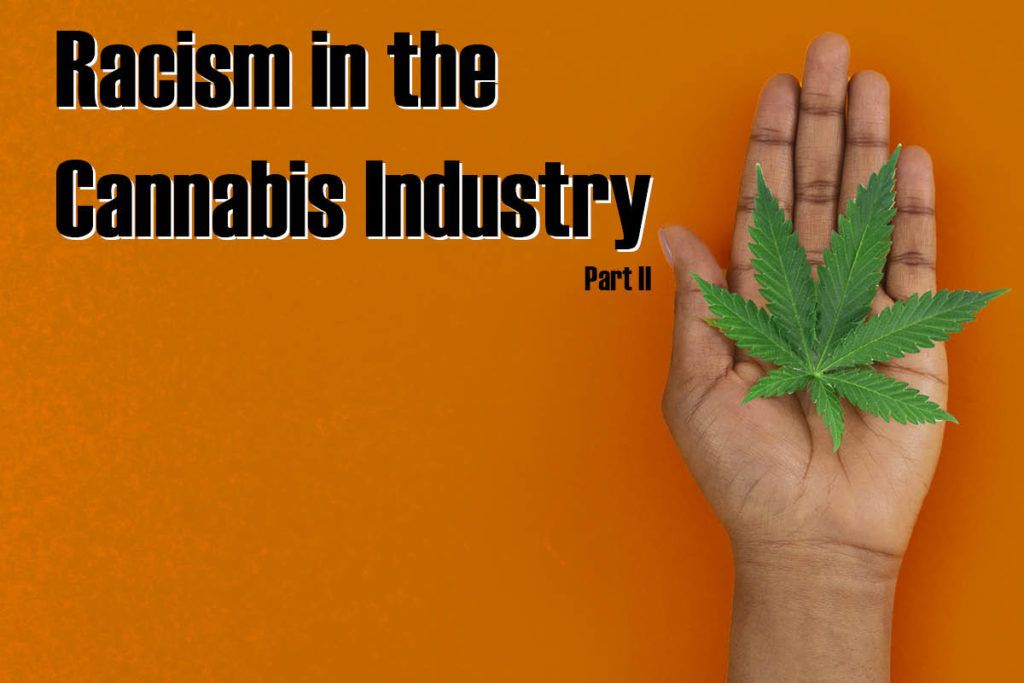
(This is the second installment of a two-part series in which black cannabis executives discuss racism in the industry and ways to address it. The first installment is available here.)
(Click on the orange arrows to advance the slideshow.)

A growing trend in the cannabis industry nationwide has been centered on social equity and how companies, as well as regulators and politicians, can help make amends for the harms wrought by the war on drugs.
While social equity programs are gaining steam nationally, that likely won’t address institutional racism or the larger aim of building a truly inclusive supply chain throughout the marijuana industry.
Marijuana Business Daily asked several Black cannabis business owners and executives for their thoughts on how companies and other executives could help move the industry in that direction.
The responses have been edited for length and clarity.

What can be done to address racism, particularly among companies and executives that want to move toward an inclusive industry and supply chain?
Economic equality is critically important in this industry.
Without it, getting into this industry is like starting a Monopoly game when someone already owns half the properties. The disadvantage is obvious.
I see three ways we can help create an inclusive cannabis industry:
- Raise minority ownership stakes through cannabis licensing. Wealth in cannabis will be about equity/ownership. We need to create opportunities for minority access and offer economic incentives like tax breaks, access to capital and waived or reduced licensing fees.
- Change our response to the traditional market. We need to move away from enforcement in the form of Drug War 2.0 and toward inclusion. This industry has an opportunity to create a unique business model. Taxation and bureaucracy are hurting everyone, but especially the smaller guys. I’d like to see the industry create a legitimate business structure to provide a transition for small traditional-market operators. This would give everyone skin in the game.
- Vote with our dollars. Every cannabis business needs to evaluate who they’re doing business with and work toward a fairer playing field. Every consumer needs to understand that every dollar they spend is a vote to determine who is and is not successful in cannabis. We all need to cast our votes for those companies that represent our values. Right now, it’s a volume game. If we could get the industry to shift and support more craft producers, you’d see a better product.
At the end of the day, the modern cannabis industry was built on “safe access.”
But access has suffered across the board. So we need to stimulate the industry, and those who are passionate about it – regardless of race – in multiple ways so there is a more level playing field.

What can be done to address racism, particularly among companies and executives that want to move toward an inclusive industry and supply chain?
The owners and executives of these companies need to have extensive diversity training, which will filter down to the various staff levels.
I know of only one minority vice president of human resources. … There may be more, but I doubt it.
The Cannabis Trade Federation’s Diversity, Equity and Inclusion (DEI) Task Force chair is working in conjunction with the board of directors of CTF to have a report containing recommendations to be adopted throughout the industry within the next two to three months.
We have been working on this for several months now.
The CTF Task Force members are some of the most well-known national civil-rights leaders and advocates in the country who are actively engaged.
I should add that the DEI Task Force was created by the board of directors last year.
To me, this is the right direction, which will have a tremendous impact on our industry regarding racial inequities.

What can be done to address racism, particularly among companies and executives that want to move toward an inclusive industry and supply chain?
Interesting you brought up supply chain, because in Colorado, supply chain and supplier diversity are the only way we’re going to see any diversity.
The industry is maxed out in Colorado.
We have maximum numbers of dispensaries and grow facilities, with little room for a lot more growth.
So the growth is going to have to be in things like:
- What does your C-suite look like?
- Do you have an equitable C-suite? Equitable doesn’t mean one black person or one minority woman.
- How does your supply chain look? Where do you get your paper products? Who does your packaging? Who’s your graphic designer? What marketing firm do you use?
There are definitely Black and brown companies that can fulfill all of those needs.
But the bigger piece is going to have to be the following: Since the city and the state control licensing, they’re going to have to make a concerted effort to make sure that all new licenses go to people of color.
Now, that is absolutely going to make a lot of people upset and uncomfortable, because they’re going to feel like they’re being penalized for being white and male.
But my response to that would be, “Look how many people were penalized for being Black at the beginning of this.”
No matter how we do this, there are going to be hurt feelings and hurt egos, and politicians are going to have to walk a very stringent line of not looking like they’re giving priority to one group over another.

What can be done to address racism, particularly among companies and executives that want to move toward an inclusive industry and supply chain?
I believe companies need to first look within and ask, “Are we creating diverse teams? Are we identifying diverse managers at the senior levels?”
As an industry, we service people from all backgrounds. It is time they start connecting with these communities directly.
I would also suggest building diverse relationships among our industry organizations. Consider partnering or contracting minority-owned businesses for services.
Cannabis is still the new frontier, and we as an industry can break a cycle.
In my businesses in DC and Louisiana, my teams are diverse. I intentionally seek out women-owned and minority-owned service providers.
We have an opportunity to be the change; otherwise, we are just like any other industry dealing with inherent systemic racism issues.

What can be done to address racism, particularly among companies and executives that want to move toward an inclusive industry and supply chain?
There are a few things I would recommend focusing on:
- Develop a corporate culture where diversity, equity and inclusion are foundational pillars.
- Identify areas where your company may be lacking in the execution of DEI (diversity, equity and inclusion) initiatives and strengthen these policies.
- Build teams that reflect markets and customers.
- Foster diverse thinking within the organization.
- Support other companies that hold to these same standards.
These are a few ways we’ve tried to achieve this within our organization and, by extension, to the teams we’ve worked with and led in other organizations.
Racism and discrimination are social constructs that were created for a very specific purpose.
Undoing these intricate societal constructs will not happen easily or overnight.
As a Black man, I’m well aware of how I may be perceived in my blacked-out, fitted Yankee hat, hoody and fresh Nikes whilst stepping out of my blacked-out Range Rover, regardless of my level of education or my perceived “success.”
However, I use the way I conduct myself in all areas of my life to break down the social constructs imposed on me by society.
At the end of the day, I’m just a guy who loves weed, loves life and tries every day to have meaningful positive interactions with all that cross my path.
As a human, that’s all I can really do to change the world’s perceptions of me and those like me: one thought, one encounter, one conversation at a time.

What can be done to address racism, particularly among companies and executives that want to move toward an inclusive industry and supply chain?
I feel like the owners have to put the mission, the vision, the values of the company out there so the employees understand what it is.
And then the owners have to follow up to make sure that mission and those values are being followed throughout the company.
It’s really a matter of holding their own selves accountable to their beliefs and their mission – and taking steps to make sure that happens.
Pure Cannabis Hemp Oil
- Pure CBD Tincture, derived from organic, US-harvested hemp, lab-tested for quality.
- Clinically proven therapeutic effects.
- Relieves anxiety and stress
- Eliminates chronic pain and aches
- Regulates mood and sleep patterns
- Enhances focus and clarity
more details, George Scorsis
Originally posted on via Cannabis Industry News

No comments:
Post a Comment